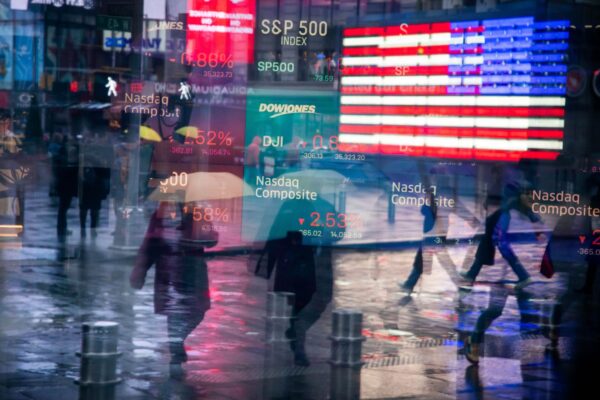By Rita Nazareth
The stock market found little encouragement to sustain any rebound attempt on the eve of the all-important US jobs report, with major benchmarks solidly down in afternoon New York trading.

Aside from the anxiety that usually precedes those numbers, traders had to digest remarks from a raft of Federal Reserve officials who sounded unequivocally committed to crushing inflation with rate hikes. The hawkish rhetoric helped send the S&P 500 toward its second straight day of losses while lifting the dollar and Treasury yields. Oil topped $88 a barrel.
In the run-up to the payrolls data, jobless claims figures continued to paint the same mixed picture of a labor market that’s showing some signs of moderation while still remaining robust. With that in mind, several economists believe it may be just too early to think about concepts like “peak hawkishness” or “Fed pivot” at this stage.
And officials are making that clear.
The central bank is “quite a ways away” from pausing its campaign of rate increases, Minneapolis Fed President Neel Kashkari said. His Chicago counterpart Charles Evans said the benchmark rate will probably be at 4.5% to 4.75% by next spring — from the current 3% to 3.25% range. Cleveland Fed President Loretta Mester noted the US is in an unacceptably high inflation environment.
Read: Fed’s Cook Stresses Resolve to Curb Inflation in Debut Speech
“I don’t think the Fed is going to be ready to pivot so quickly,” said Rich Steinberg, chief market strategist at The Colony Group. “We’re going to be in this kind of tug of war between good news, bad news. There’s going to still be a lot of volatility to this market.”
Investors counting on a Fed pivot any time soon are bound to get burned again, according to PGIM Fixed Income.
“We’ve seen this movie time and time again,” said Greg Peters, co-chief investment officer at the Newark-based firm, in an interview. “The market gets hyped up on different narratives between inflation releases. I’ve been surprised by it, and we’ve been using it as an opportunity to sell into.”
With the economy likely to slow down next year, tech stocks and US equities are looking more attractive, according to Citigroup Inc. strategists led by Robert Buckland. They expect 18% returns for global stocks by the end of 2023 but warn “it will likely be a volatile ride.”
Meantime, retail investors are stepping up their exodus after bailing on equities during the September rout. They have kept selling this week even as the S&P 500 posted its biggest two-day rally since April 2020, according to an estimate by JPMorgan Chase & Co. based on public data on exchanges. Hedge funds tracked by Morgan Stanley entered October with net equity exposure sitting near a 13-year low.
“Higher interest rates, slower growth is not a good environment for stocks. That’s what equity investors are looking at right now — they’re looking at a Fed that seems intent on continuing to aggressively hike rates in the face of inflation,” said Chris Gaffney, president of world markets at TIAA Bank. “And the purpose of that is to slow the economy, which is negative for stocks.”
As rising interest rates rattle investors and threaten businesses’ profits, the US corporate-bond market will likely come under increased pressure, according to Arvind Narayanan at Vanguard Group Inc., who said the finances of corporations are “weakening incrementally” from very strong levels, which he anticipates will continue through the rest of 2022.
Mortgage rates in the US fell, shifting direction after a six-week streak of gains that sent borrowing costs to a 15-year high. Even with the latest decline, mortgage costs have more than doubled since starting the year around 3% — a steep climb that has slammed the brakes on the pandemic housing rally, highlighting one of the Fed’s goals in its effort to cool inflation.
Elsewhere, Canada two-year yields hit the highest level since 2007 after the nation’s central bank Governor Tiff Macklem said he remains firmly on a rate hiking path because of worries about elevated domestic price pressures and inflation expectations becoming entrenched.
Key events this week:
- US unemployment, wholesale inventories, nonfarm payrolls, Friday
- BOE Deputy Governor Dave Ramsden speaks at event, Friday
- Fed’s John Williams speaks at event, Friday
Some of the main moves in markets:
Stocks
- The S&P 500 fell 1% as of 2:58 p.m. New York time
- The Nasdaq 100 fell 0.6%
- The Dow Jones Industrial Average fell 1.2%
- The MSCI World index fell 0.8%
Currencies
- The Bloomberg Dollar Spot Index rose 0.7%
- The euro fell 0.9% to $0.9796
- The British pound fell 1.5% to $1.1152
- The Japanese yen fell 0.3% to 145.04 per dollar
Cryptocurrencies
- Bitcoin rose 0.2% to $20,032.96
- Ether rose 1% to $1,358.25
Bonds
- The yield on 10-year Treasuries advanced six basis points to 3.81%
- Germany’s 10-year yield advanced five basis points to 2.08%
- Britain’s 10-year yield advanced 13 basis points to 4.17%
Commodities
- West Texas Intermediate crude rose 0.8% to $88.50 a barrel
- Gold futures were little changed
More stories like this are available on bloomberg.com




